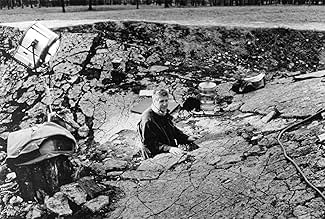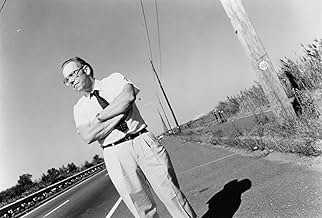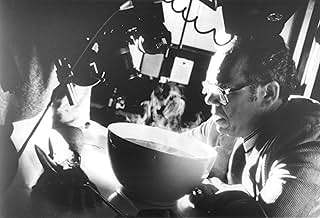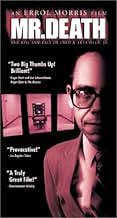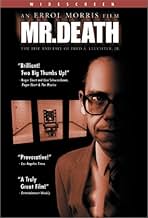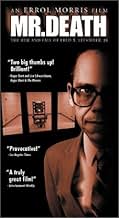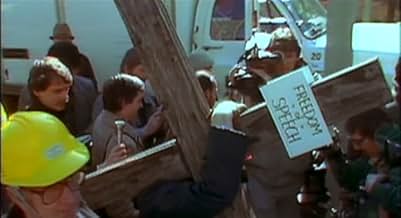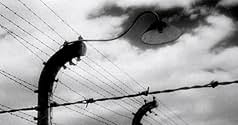Mr. Death - Grandeur et décadence de Fred A. Leuchter Jr.
Titre original : Mr. Death: The Rise and Fall of Fred A. Leuchter, Jr.
- 1999
- Tous publics
- 1h 31min
NOTE IMDb
7,5/10
5,9 k
MA NOTE
Ajouter une intrigue dans votre langueA cinematic portrait of the life and career of the infamous American execution device designer and holocaust denier.A cinematic portrait of the life and career of the infamous American execution device designer and holocaust denier.A cinematic portrait of the life and career of the infamous American execution device designer and holocaust denier.
- Récompenses
- 1 victoire et 8 nominations au total
Fred A. Leuchter Jr.
- Self
- (as Fred Leuchter)
Caroline Leuchter
- Self
- (voix)
Adolf Hitler
- Self - Leaves Plane
- (images d'archives)
- (non crédité)
Errol Morris
- Self - Interviewer
- (voix)
- (non crédité)
Avis à la une
In Errol Morris's film, "Mr. Death", Fred Leuchter Jr. comes across as a passionless, mechanical robot, fitting the engineering profession that he devoted his life to. Leuchter, the innovator of many death penalty devices and subsequently the only scientist willing to testify favorably in a celebrated Canadian trial that questioned the existence of the Holocaust, is either a hero to some or a villain to many. Morris, except for a Frankenstein-inspired opening and closing set in the film, prefers to let Leuchter be Leuchter rather than adding more contempt to a decidedly pitiful figure. The one time Morris does appear to interfere is when he asked Leuchter point blank if he could have been mistaken in any of his analysis. There are also camera tricks which render what Leuchter did as malicious, such as the split screen between what was Auschwitz and now, the slow-motion as Leuchter is chipping away at sites many Jews consider holy ground, and the phasing in and out of color and black and white film as we see Leuchter demonstrate his electric chair. The motivation behind what he did lies at the heart of "Mr. Death". He aspired to perfect the most humane killing machine because he said he believed in capital punishment, not capital torture. He cared that prison guards who knew the death-row inmates well would not have to suffer cleaning up the morbid residuals of those electrocuted. Yet he tried to carry this same mind-set in understanding the gas chambers at Auschwitz. In his mechanical mind, he asked how he could have done a better job of extermination. "Mr. Death" is an unpleasant but needed lesson about the mosaic people who live and work with each of us everyday - a people who seem anti-social yet amoral and who seem to be guided by that inner light that we can barely know or understand.
Leuchter is an expert in execution technology (designer of electric chairs, gas chambers, etc.), whose career was wiped out when he got swept up in the Holocaust revisionism movement (he testified, as an expert witness in a defamation suit, that the Auschwitz crematoria could not and did not serve as gas chambers). In this vivid documentary, Morris lets Leuchter speak for himself (which reveals him to be a man of limited horizons with a - let's say - quirky moral code, likely undone by hubris rather than evil [although Morris may deliberately be making that as far as possible an eye-of-the-beholder issue]), while providing a blizzard of visual accompaniments that emphasize the lurid raw material of Leuchter's life (a strategy indicated by the B-movie undertone of the title), and flirt with his obvious sense of his own heroism. Leuchter has more than enough rope here to hang himself, and pretty much gets the job done. Morris doesn't try to explore the issue of Holocaust revisionism generally, pretty much taking our revulsion on faith: if anything, from my limited previous reading on the subject, that's doing Leuchter a favor. Anyway, revulsion or not, it's hard not to be fascinated by a man who can calmly chatter about his value-pricing approach to selling death machines (although custom made, he tells us, they're sold at "off the shelf" prices).
I have never seen a movie handle moral ambiguity quite like this before. It's ambiguous on so many levels. FL Jr. worries about the humanity of the methods of execution, and it never occurs to him that the act itself is inhumane. The obvious hatred in the face of Shelly Shapiro (leader of a Holocaust remembrance group) makes you wince at the moral ambiguity of her acts. And finally that this mouse of a man is neither Jesus nor Hitler (two comparisons made in the film) is the only firm footing you are left with. Not earth-shattering, but what a film!
Leuchter is one amazing guy. This is a guy who became one of the US's foremost experts on death engineering - he designed and built/rebuilt several execution devices for death rows throughout the nation. Then, tragically, he took it upon himself to travel to Auschwitz and hammer bits off the gas chambers to bring home for cyanide testing. His conclusion: no-one was gassed there. Oops. Then he compounded his mistake by testifying for Ernst Zundel and speaking at holocaust-revisionist meets throughout the world.
So, an excellent subject for a movie, and Morris does an okay job. There are a few faults. The quality of some of the interview footage is quite poor. And there is the question of the reconstructions. Leuchter provided Morris with plenty of "home movies" which are incorporated into the film, so the function of the reconstructions seems merely to be to reinforce in our minds the dramatic qualities of a lot of the actions Leuchter performed. Personally, I could've done without them.
10/10 for the subject, 6/10 for the film-making, gives 8/10 overall.
So, an excellent subject for a movie, and Morris does an okay job. There are a few faults. The quality of some of the interview footage is quite poor. And there is the question of the reconstructions. Leuchter provided Morris with plenty of "home movies" which are incorporated into the film, so the function of the reconstructions seems merely to be to reinforce in our minds the dramatic qualities of a lot of the actions Leuchter performed. Personally, I could've done without them.
10/10 for the subject, 6/10 for the film-making, gives 8/10 overall.
Fred A. Leuchter, Jr., the subject of this documentary, is a lonely man, and so a man of narrow acumen, because he's just appreciative to be liked, even by Nazi sympathizers. Errol Morris conjoins montages and music into a movie that is more reflection than subjective report. Fred Leuchter, the son of a prison warden, relatively floundered into the Death Row business. An engineer by training, he was inspired by the urge for more competent and compassionate execution apparatuses. He'd seen electric chairs that fried their sufferers without killing them, poison gas chambers that endangered the witnesses, gallows not efficiently constructed to break the neck. He went to work fashioning better versions of these devices, and soon prisons throughout the US were taking his council.
Notwithstanding his advance in trade, he was not, we understand, particularly well-received socially, though he does come to marry a waitress he meets owing to his habit of more than forty cups of coffee a day. We hear her offscreen voice as she balks at Fred's belief that their trip to Auschwitz was their honeymoon, where she had to wait in a freezing car, looking out for guards. Leuchter's visit to Auschwitz was the crossroads in his work. He was asked by a neo-Nazi Holocaust denier to provide a professional opinion at his trial. Zundel financed Leuchter's 1988 trip, where he chiseled off chunks of brick and mortar in buildings used as gas chambers and had them examined for leftover cyanide. He resolves that the chambers never had capacity for gas.
There is a fault in his report, needless to say. The lab technician who analyzed the samples for him protests that cyanide would sink into bricks but to the measure of one-tenth of a hair. By chiseling large bits, Leuchter had eroded his sampling by several thousand times, not even taking into account the ravages of half a century. To find cyanide would have been supernatural. No bother. Leuchter became a darling after-dinner mouthpiece in the neo-Nazi circle, and the camera captures how his face illuminates and his whole body appears to embrace their cheers and ovations, how thrilled he is to shake hands with his new friends. Other people might recoil from the derelict position of a Holocaust denier, to say the least. An executioner is a derelict anyway and finds his friends where he can.
No filmmaker can be accountable for those reluctant or unfit to take in his or her film with a discerning view. Anyone who leaves this deeply unsettling film concurring with Leuchter lays claim with him on the verge of psychosis. What's unsettling about the film is the way Leuchter is fairly honorable up till the point at which the neo-Nazis sink their talons into him. Those who are revolted by ethnic cleansing and other forms of government-sponsored genocide sometimes have no pangs when the state executes them one by one, testing them on elephants as is appallingly shown early in this film through dog-eared stock footage. One can even be a two-term president after governing the most restless American Death Row on record.
In cinema, the Holocaust intensifies melodrama in that the conquest of the soul never struck so victorious against atrocity, because the atrocity is so confounding. Morris's haunting documentary tries to do something distinct. It's to attempt to penetrate the thought process of denial. You meditate on the general concept of denial, not as some postwar sensation but as something that was intrinsic in the undertaking itself. Those people did those things. The mystery is how. It's about deciphering why Fred Leuchter holds these beliefs.
There is paradox in of so many U.S. states heaping tax money on this guy's work, just to oust him because of his distasteful affiliations. The capability of so many people to live contentedly with the notion of capital punishment may be a hint to how so many Europeans could live with the Holocaust: When you swallow the idea that the state has the right to kill someone and the right to decide what is a cardinal wrongdoing, you're nearly there. Mr. Death offers no complacent position of judgment. He doesn't make it obvious for us with light ethical categorizations, because people are formidably paradoxical and can get their minds around fearsomely peculiar notions.
Notwithstanding his advance in trade, he was not, we understand, particularly well-received socially, though he does come to marry a waitress he meets owing to his habit of more than forty cups of coffee a day. We hear her offscreen voice as she balks at Fred's belief that their trip to Auschwitz was their honeymoon, where she had to wait in a freezing car, looking out for guards. Leuchter's visit to Auschwitz was the crossroads in his work. He was asked by a neo-Nazi Holocaust denier to provide a professional opinion at his trial. Zundel financed Leuchter's 1988 trip, where he chiseled off chunks of brick and mortar in buildings used as gas chambers and had them examined for leftover cyanide. He resolves that the chambers never had capacity for gas.
There is a fault in his report, needless to say. The lab technician who analyzed the samples for him protests that cyanide would sink into bricks but to the measure of one-tenth of a hair. By chiseling large bits, Leuchter had eroded his sampling by several thousand times, not even taking into account the ravages of half a century. To find cyanide would have been supernatural. No bother. Leuchter became a darling after-dinner mouthpiece in the neo-Nazi circle, and the camera captures how his face illuminates and his whole body appears to embrace their cheers and ovations, how thrilled he is to shake hands with his new friends. Other people might recoil from the derelict position of a Holocaust denier, to say the least. An executioner is a derelict anyway and finds his friends where he can.
No filmmaker can be accountable for those reluctant or unfit to take in his or her film with a discerning view. Anyone who leaves this deeply unsettling film concurring with Leuchter lays claim with him on the verge of psychosis. What's unsettling about the film is the way Leuchter is fairly honorable up till the point at which the neo-Nazis sink their talons into him. Those who are revolted by ethnic cleansing and other forms of government-sponsored genocide sometimes have no pangs when the state executes them one by one, testing them on elephants as is appallingly shown early in this film through dog-eared stock footage. One can even be a two-term president after governing the most restless American Death Row on record.
In cinema, the Holocaust intensifies melodrama in that the conquest of the soul never struck so victorious against atrocity, because the atrocity is so confounding. Morris's haunting documentary tries to do something distinct. It's to attempt to penetrate the thought process of denial. You meditate on the general concept of denial, not as some postwar sensation but as something that was intrinsic in the undertaking itself. Those people did those things. The mystery is how. It's about deciphering why Fred Leuchter holds these beliefs.
There is paradox in of so many U.S. states heaping tax money on this guy's work, just to oust him because of his distasteful affiliations. The capability of so many people to live contentedly with the notion of capital punishment may be a hint to how so many Europeans could live with the Holocaust: When you swallow the idea that the state has the right to kill someone and the right to decide what is a cardinal wrongdoing, you're nearly there. Mr. Death offers no complacent position of judgment. He doesn't make it obvious for us with light ethical categorizations, because people are formidably paradoxical and can get their minds around fearsomely peculiar notions.
Le saviez-vous
- AnecdotesAccording to A Brief History of Errol Morris (2000), Morris made a rough cut that he showed to colleagues and friends that only had Leuchter interviewed and it was Morris' intention that the audience would understand he was saying things either as lies or flat-out wrong. He was advised to go to Auschwitz and dig deeper so that there would be no doubt for the audience that Leuchter was wrong.
- Citations
Fred A. Leuchter Jr.: The human body is not easy to destroy and it's not easy to take a life humanely and painlessly without doing a great deal of damage to the individual's body.
Meilleurs choix
Connectez-vous pour évaluer et suivre la liste de favoris afin de recevoir des recommandations personnalisées
- How long is Mr. Death: The Rise and Fall of Fred A. Leuchter, Jr.?Alimenté par Alexa
Détails
- Date de sortie
- Pays d’origine
- Langue
- Aussi connu sous le nom de
- Mr. Death: The Rise and Fall of Fred A. Leuchter, Jr.
- Lieux de tournage
- Sociétés de production
- Voir plus de crédits d'entreprise sur IMDbPro
Box-office
- Montant brut aux États-Unis et au Canada
- 507 941 $US
- Week-end de sortie aux États-Unis et au Canada
- 24 125 $US
- 2 janv. 2000
- Montant brut mondial
- 507 941 $US
- Durée
- 1h 31min(91 min)
- Couleur
- Mixage
- Rapport de forme
- 1.85 : 1
Contribuer à cette page
Suggérer une modification ou ajouter du contenu manquant

